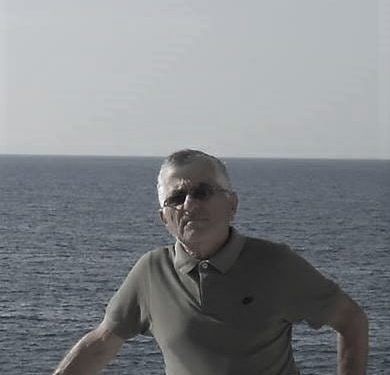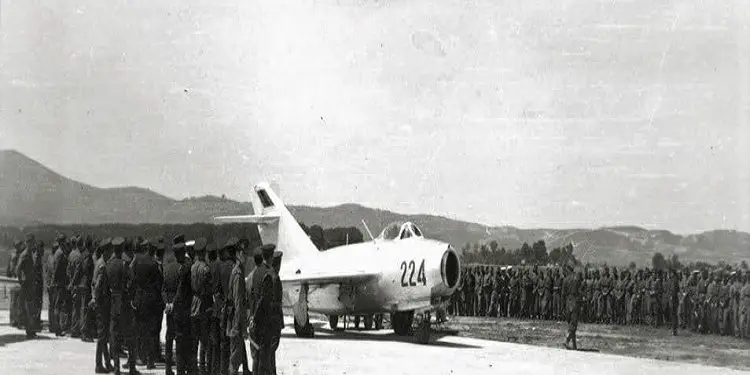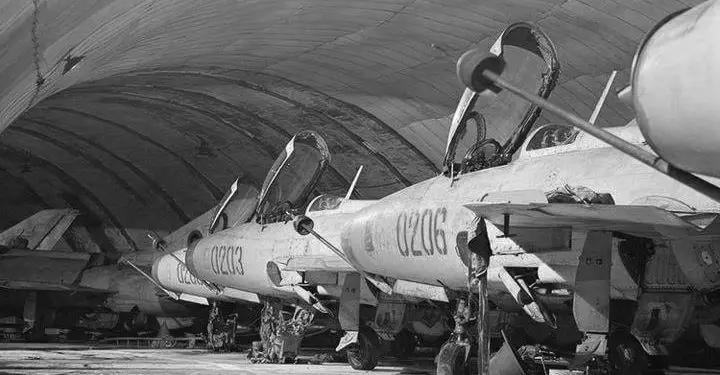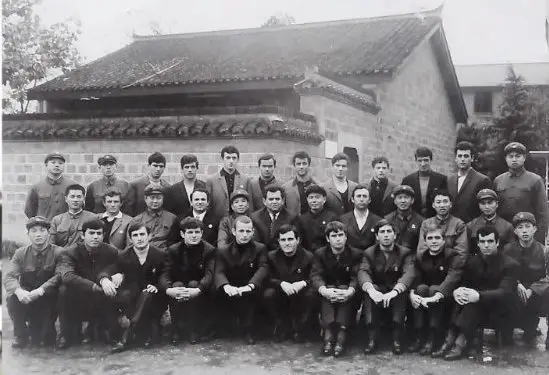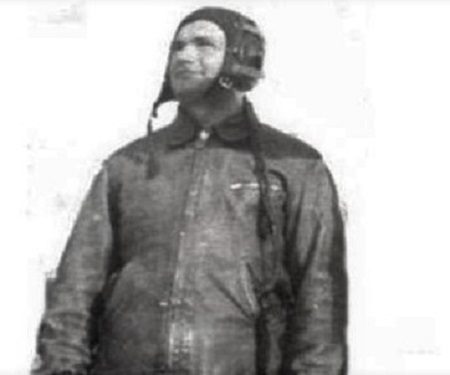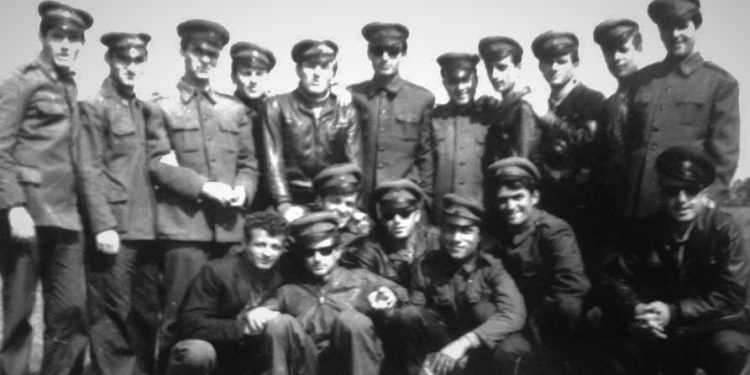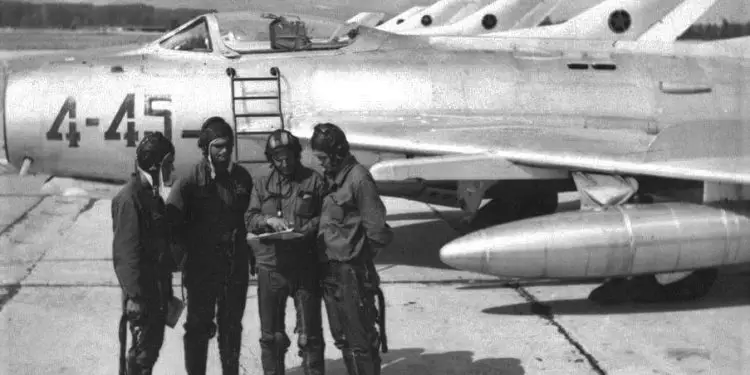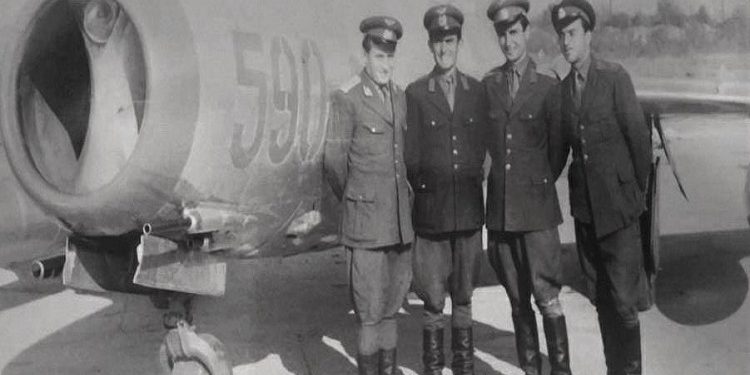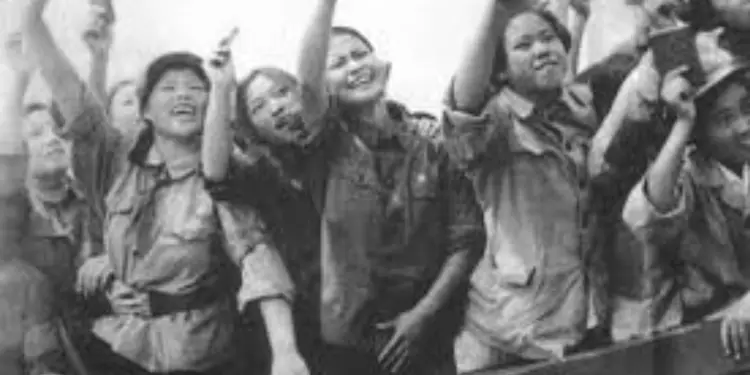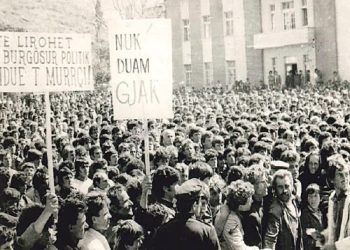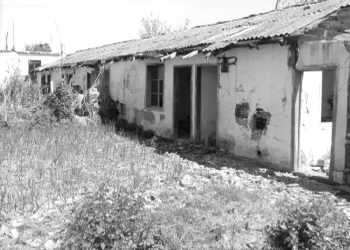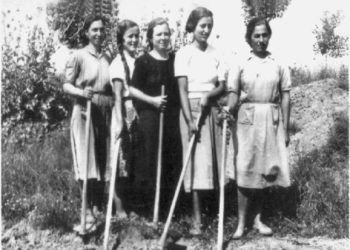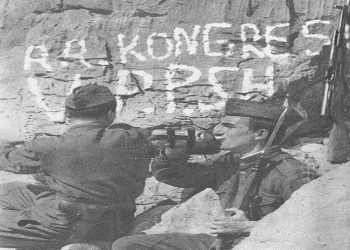By Niazi Nelaj
The third part
– At the Chinese Military Aviation School –
Memorie.al / Expelled from the Soviet School of Aviation, with dreams cut in half, part of the group of student pilots, who had studied for a year in the city of Bataysk, on January 8, 1962, after a “hell” cruise ”, with a cargo ship, we arrived at the center of China’s Third Military Aviation School in Chin Zhou City. It is located in the “heart” of Manchuria; at that time there were about 200,000 inhabitants. Without any prominent industry. A city with 2-3 story buildings but paved roads. The terrain around the city was plain; next to it are the Western shores of the Yellow Sea. One of the values of this city was the fact that it was the center of China’s Third Military Aviation School. My going to this school and that city was a lucky chance. In the list of 7 students of our course, which included: Adem Çeça, Dhori Zhezha, Mihal Pano, Bashkim Agolli, Andrea Toli and Sherif Hajnaj (Bracki), my name, Niazi Nelaj, was included, quite by chance.
Continues from last issue
I am forced to underline the phrase “temporary relationships”, because each of us was clear that the marriage of Chinese women with foreigners and vice versa were strictly prohibited. At the beginning, when we set foot on Chinese soil, the hosts, after introducing us to the norms and rules of life in that country, read us a law, in which it was written clearly and in large letters that: “Marriage of Chinese women with foreigners is prohibited and of men from China, with girls from other countries”.
To make it more convincing, we were given an example of how a Yugoslav sailor was kept in prison for trying to rape a local woman since 1948. So none of us could go against the laws of the country. . The Chinese did not joke about such serious things; what they proclaimed, they implemented, without hesitation.
Our friend, who was admitted to the Central Aviation Hospital, in Beijing, before being admitted and after leaving the institution, walked around the Chinese metropolis, also walked in the famous park “Tungu Jen”, where it was said that divorced women roamed , expelled, after the liberation of China from the public houses of Shanghai and any other city. The opinion circulated that, in the first years, after the liberation of the country, about 40,000 divorced girls were released from brothels.
I cannot leave without mentioning 2-3 aspects of life in that Asian country, which was almost unknown to us. First, the Chinese call their country “Cungo”. If I tried to translate it into our language, this phrase would mean: “The center of the world”. A very nationalistic slogan. According to him, everything related to the history of mankind has its origin in China. Even the terrestrial globe, in its center, has China.
We passed through the paved streets of the city and stepped on some drawings, in white chalk, where a large human nose was clearly visible, with which they mocked our nose. In their opinion, the Chinese man was the most beautiful in the world, the most handsome, the smartest, the most dexterous, the bravest and many other “mores”. These considerations served to show the superiority of the Chinese man over others. In my opinion, both then and now that I are writing these memoirs, the mentality of the natives, for this matter, was and remains racist; drained.
When we went to China and were not yet familiar with them, we had a very difficult time identifying people. They all looked the same to us and we confused them with each other, like we do with twins. It took a long time to tell the difference between them. Granted, it’s an external identification, apparently. To them we were the same. Therefore, when we went out to the city, for ordinary work (for some shopping or just for a walk), we were accompanied by a stream of people, of different ages, genders and levels.
The waves of those who accompanied us, without our request, resembled the party rallies of today’s time, in our country, in support of one or the other political party. The Chinese looked at us in amazement and just gestured, with an open hand, showing our big nose. We must have looked like aliens to them. Apparently, no European had set foot in those parts until then. Second, in the 60s of the last century, China was poor and the Chinese lived on rationed food that was given with tolls. Food and cotton clothing were the problem. The greatest wealth a Chinese man had in those days was a wristwatch and a bicycle. It was not about cars, home furnishings and luxury appliances.
We had classrooms and dormitories on the third floor of the building, with a tiled roof. We had windows facing North and North-West. The height allowed us to see how the locals lived, in some mud-built, one-story shacks, where, as a rule, a family of 5-6 members was housed. Rural families and those on the outskirts of cities, in those years many children were born. Birth restrictions were applied later. With our excessive curiosity, we had noticed that (the shanties where they lived were without doors; the curtains that replaced the doors allowed us to see what was going on inside them), one family had only one pair of pants.
He wore them when he left the door of the house; the others were without anything. Extreme poverty. In my village, I had once seen poor people whose clothes were all mixed up, you didn’t know what color they were, but no matter what they were, they each had a pair of pants. Third, near the school there was a connecting road and a small river, which looked more like a watery stream. We watched both of these objects, for hours, standing above the windows or from the corridors. The highway came from the Northwest of Liaoning Province and led to the city of Qin Zhou. On days when there was shopping in the city, a river of people flooded that street, in complete chaos.
We often went out to the city and stayed for a while. The purpose of our outing was to change the environment a bit, watch people dressed in civilian uniform and relax a little. We were ordered to go out in the city in groups of 3-4 or more students; for safety effects. Our Russian translators accompanied us every step of the way. Interpreters were the name, because in fact, they were the trackers of our surveyors. Under the guise of a translator and with the justified motive that they should take care of our lives, these “translators” did not leave us alone, and became like “mother’s husband” with a living father.
Wherever we stepped, the translator would also sprout from the soil. There were not a few. An interpreter was assigned to each flight group, which usually had 3 students. Of all the breed of translators, only one, Petja, with a Russian mother and a Chinese father, from the Uighur Autonomous Province, was fluent in both Russian and Chinese. Others told the leg; hand. Petya was tall, in his forties, with straight, black and rough hair, like wire, like the Chinese have. Petja’s Russian mother had two sons with her Chinese husband: Petjan and Vollodjan. The latter was a pilot in the Civil Air Fleet of China and flew the ‘IL-14’ planes in Beijing.
Petja was a very good man, cultured and competent in his profession. He treated me and my friends as a friend. He understood us and we understood him. It was not like Petja, a woman with glasses, who was dressed in military clothes and claimed to be a translator from Russian to Chinese. She was short, “compressed” and did not know Russian or Chinese well. There was no question of knowing Aviation terminology. She didn’t even know how to walk in the street, like a soldier. It was a real ‘slap’.
One day, this “translator” of ours was translating a Chinese war movie into Russian for us. Those were the moments when the Japanese forces arrived on the battlefield. In the middle of that calm, when people were holding their breath and anxiously waiting for the further development of events, she solemnly and with a strong voice translated “prishli jebanci”! He should have said the Japanese arrived, but he said, “The stallions arrived”! We laughed, with tears.
The other “translators” also laughed, especially Petja, who spoke Russian well. Another time, when he was translating the explanation given to us by the instructor of the piloting technique, about a figure (an element of the combat use of the aircraft), instead of saying: “bojevoj razvorot”, which means “combat turn”, said: “vojennij razvorot”, which means: “military turn”, etc. Her “blunders” could not be counted. I have shown these, in order to argue the point that they were not translators, but trackers.
To tell the truth, the translators, who should normally be the closest and dearest people to us, became so annoying and unwanted that we unfairly put someone in the game. Perhaps, on the side of this argument, in a later case, I will bring you some personal, of course, unpleasant feelings and perceptions that have to do with student: translator relationships, in those school environments and beyond.
But now we are continuing the narrative of the organizational activities for the presentation of the third Chinese Military Aviation School. I will also show you about the regime of our life, in that school, as the commander of the Albanian Aviation had ordered: “Treat them like the locals”!
On the first day, upon our arrival at the school grounds, we were each given a beautiful, high-quality, flower-embossed porcelain basin that held about 10 liters of water. The flowers that glittered on the sides of the basin were in the Chinese style: Dragons, pagodas and other flowers, beautifully combined, obviously the products of local masters, who, in this field, are unmatched. They also provided us with a cotton towel, measuring 100 X 50 cm, like the ones we use to wipe our faces after washing.
The adjutant of the department, a captain, tall, with a body as if he was cut for a sergeant, led us, in the company of the “interpreter”, to a separate room where several sinks were beautifully installed. Above each sink was a yellow tap from which no water flowed. The adjutant, as if he were telling us some extraordinary invention, demonstrated how to wash the face. This was really interesting and unknown to us.
The soldier opened one of the faucets and poured several liters of water into the basin. It probably filled the basin with water to a third of its depth. As much as it was enough to wet and squeeze the towel. He wet and lightly squeezed the towel and, with the wet one, rubbed his face, corner to corner. The story that the adjutant told us was clear and simple. We all understood and there was no need to repeat his action.
The purpose of this “indicative lesson” was to learn that water should not be wasted but saved in the school grounds. In Chinese environments, the face, hands, feet, are not washed with running water from the tap, but as the officer of the economic branch of the school told us. The only purpose of this action was to save water. As in all directions, even in the matter of water consumption, the Chinese are good hosts.
The second commandment was related to how to use water for drinking. In the territory of our garrison, there were plenty of taps, but only hot, scalding water flowed from their taps. The Chinese only drink warm water. Like the Vietnamese in the Soviet Union, who wore the gourd on their waist belt?
I don’t know why I remembered my village, which is not famous for many sources of water, except for the river Vjosa and the cold water that comes out of the rock on its side. When I was traveling and drinking water, when I came across a tap from which water flowed, I extended one hand, in the shape of a spoon, and drank water on the sole of my hand. When I came across a spring, I put my fist into its basin and quenched my thirst with a few of these.
Here, in distant Manchuria, thousands of kilometers from the land where I grew up, I had to get used to drinking warm water. To make it easier, they provided us each with a thermos, which held about 2 liters of water inside. With the glass lining inside, the thermos kept the water, hot, as you put it in, a few hours ago. We learned to fill these water containers with warm water and, when we were thirsty, we drank, as desired, using the lid of the thermos as a glass.
Using warm water for drinking has its advantages. Firstly, a person cannot consume a lot of water, as would happen if we drank cold water, and secondly, boiled water is bacteriologically clean and protects against throat inflammations. We adapted to this innovation in our lives not at once and not without difficulty.
Fantastic, unprecedented was the bath with warm water. We were used to showers that poured water continuously, over our heads, and we rubbed ourselves with our hands. In China we found another method. There the bathroom was collective. I am talking about the military environments in which I lived. In a closed hall, a type of basin (pond) was built, in the shape of a circle, about 30 cm deep and with a radius of 7-8 m.
The bottom and sides of the basin were lined with beautiful, polished porcelain tiles. The pool was filled with warm water, as much as the body could bear. We lie down and let out only the head. We entered the base mixed, by nationality; Albanians and Chinese, together. Standing like that, in warm water, served to cleanse the skin, so that the slime was removed more easily and water was saved. We stayed in warm water for about 20 minutes. We would sit in a circle, look at each other and laugh, senseless.
In any country and from any people, you can learn interesting things about the way of life. In China, there were no surprises for us who did not know the country. We were immigrants and had to adapt to the peculiarities of life and the ways of those people. Some of their behaviors were very interesting.
We didn’t have the chance to buy eggs, as we had provided them in the canteen, but when we asked the locals about how to sell eggs, we learned a pleasant curiosity; eggs were not sold whole, like here, but by weight. This way of trading is interesting and original. It was not the only surprise we experienced in that place of surprises. We are enriching the story, with other events, lived.
One day at the barber of the military garrison
Together with my group friend, Bashkim Salih Agolli, from the village of Zvarrisht in the province of Lozhan, to whom we had given the nickname “nephew” and he was not offended by this, one day we went to the barber of the military garrison to get a haircut. Union was a man of pleasant humor. With a small body and the head of a girl, with sparse and licked hair, with a face as smooth as a skirt with flowing sides, he was a great joker. His subtle and salty humor made us laugh. You teased the “nephew” a bit, and he burst out with guffaws, which we liked and relaxed us immensely.
When he wanted to make fun of someone, the “nephew” did not say: donkey dog, but “mule’s father”. We were kept alive by our friend, with pleasant jokes and with all the slang, typical of the region of his origin. We were both ready to shave and rushed to the only barber of the garrison where we lived. Me with hair like a forest, he with that rare half-blonde hair.
The barber belonged to a young age (about 30 years old). When he saw us heading to the alcove where he worked, he greeted us with that characteristic smile, which was more like a frown. The barbershop was small and had no palaces. The main equipment was a chair, which sat down and stood up and rotated, and a mirror placed on the wall.
The work tools were from the time of “Noah”. A large razor, one of those sharpened with a leather belt, stood out. In a corner of the alcove (I can’t call it a room), there was a white porcelain basin and several eye towels were hanging around it. Above the basin was mounted a water holder, with a faucet, from which warm water came out. We took a seat on the bench near the door and waited for our turn, as long as a Chinese man was shaved.
We were not surprised by the way the Chinese sheared off, as we had seen that pattern on all the soldiers when they took off their hats. It was the same model: a high haircut, with bangs on the top of the head, which the Russians call: “Polluboks”. After the Chinese left, to respect the age (“the nephew was 2 years older), I respected my friend to sit down first. After that, the surprise begins.
The barber asked my friend, in his own language. But we didn’t understand Chinese either, in those early days, and the barber didn’t know Russian either. The translator who was close to us, had not noticed our departure from the surroundings where we usually stayed, and our friends had “covered” us in this adventure, if we can call it that. My friend, who was sitting in the barber’s chair, and I, outside, with hands and feet, as best we could, explained to the barber how to cut. Memorie.al
The next issue follows




